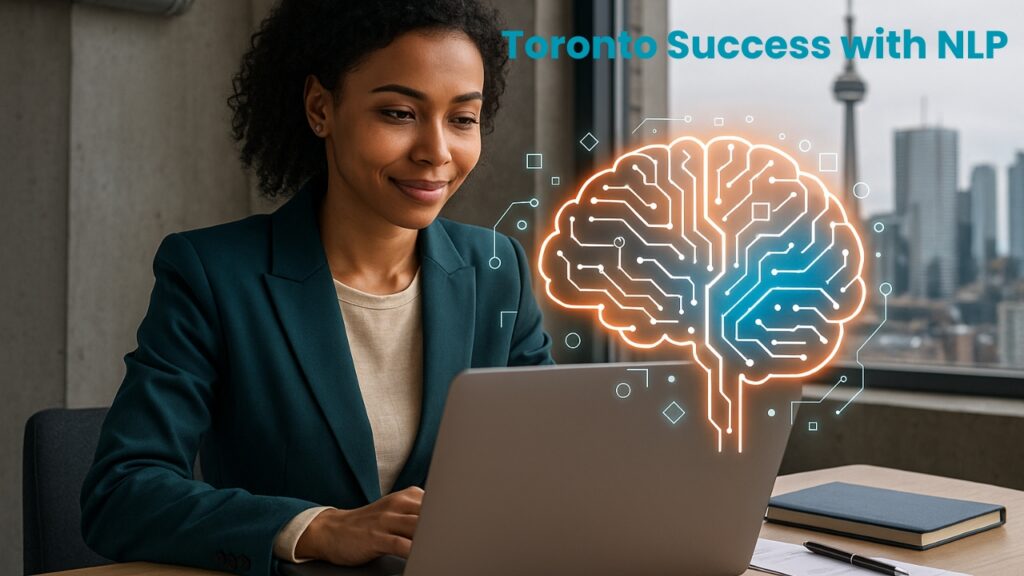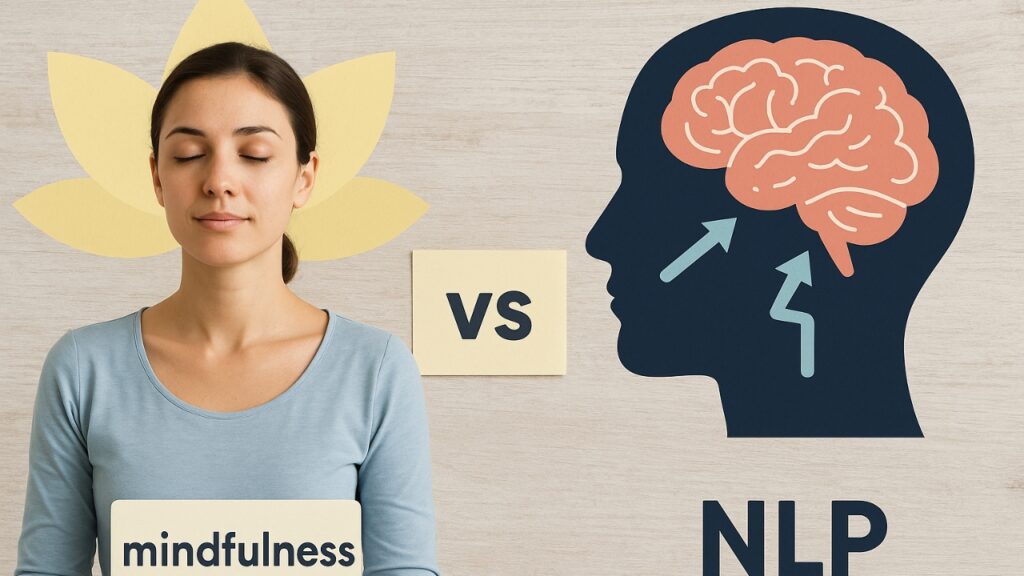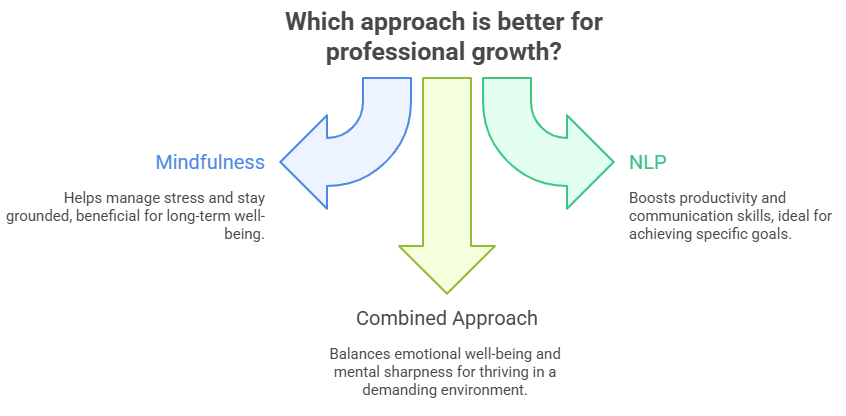In the fast-paced world of Toronto’s professional landscape, staying sharp and balanced is no easy task. Between tight deadlines, back-to-back meetings and a constant flow of emails, it’s easy to feel burned out. So, how do some professionals stay calm, focused, and even thrive under pressure?
Two powerful tools are often recommended: Mindfulness and Neuro-Linguistic Programming (NLP). While both offer impressive benefits, they take different approaches to achieving mental clarity and boosting performance. Mindfulness is all about staying present, calming the mind and improving focus in the moment.
On the other hand, NLP works by reshaping your thought patterns and behaviors, empowering you to achieve your goals faster and more effectively.
But here’s the real question: Which one is right for you? Whether you want to manage stress or level up your career, the answer depends on your needs. Let’s learn which one Toronto professionals like you can use to thrive in the workplace.
How Mindfulness Improves Mental Well-Being for Toronto Workers? From Stress to Success:
Mindfulness is being fully present at the moment, without judgment. Originating from meditation practices, it has evolved into a powerful tool for managing stress and improving focus. You can reduce distractions and enhance emotional well-being by training your mind to stay engaged in the present.

However, mindfulness isn’t just for meditation retreats; it can be integrated into your daily work routine. In the workplace, it helps you stay calm under pressure, improve focus, and quickly respond to challenges. Instead of being overwhelmed by tasks or stress, mindfulness allows you to stay grounded and manage your emotions effectively.
Key Benefits of Mindfulness for Professionals
Reducing Stress and Enhancing Resilience
Stress is a natural part of any professional environment, but mindfulness allows you to manage it effectively. By focusing on your breath or bringing awareness to the present moment, mindfulness helps you break the stress cycle. This practice fosters relaxation and clarity, allowing you to bounce back quickly from challenges and maintain your mental well-being.
Improving Focus and Productivity
In a busy workday, distractions are constant, making it challenging to stay focused. Mindfulness trains your brain to redirect attention to the task at hand. This improves your concentration and productivity, enabling you to work more efficiently, meet deadlines, and manage your time effectively in a fast-paced environment.
Strengthening Emotional Intelligence and Decision-Makingccc
Mindfulness enhances self-awareness and emotional regulation. You can make more thoughtful decisions by being present and observing your emotions without judgment. This emotional clarity improves your responses in high-pressure situations, allowing you to navigate challenges with composure and empathy.
Improving Communication and Building Stronger Relationships
Mindfulness helps you become a better listener and communicator. When fully present in conversations, you listen attentively and respond more thoughtfully. This leads to stronger relationships with colleagues, clients, and managers and enhances team collaboration, all of which contribute to a more productive and harmonious work environment.
Promoting Work-Life Balance and Preventing Burnout
Mindfulness supports a better work-life balance by helping you stay grounded and prioritize your well-being. It encourages you to take breaks, stay present outside work, and recharge mentally. This practice can help prevent burnout by fostering healthier boundaries between your personal and professional life.
Mindfulness Tip
Quick Breathing Exercise: Take a 5-minute break before your next meeting. Focus on your breath: inhale for 4 counts, hold for 4 and exhale for 4. This will help you feel calm, focused, and ready for the task ahead.
How NLP Enhances Professional Success for Toronto Workers
Neuro-Linguistic Programming (NLP) is a powerful personal and professional development approach that focuses on understanding and changing how we think, feel, and behave. By examining the connection between neurological processes, language, and behavioral patterns, NLP offers practical tools for overcoming obstacles, achieving goals, and improving communication.
It’s more than just a set of techniques, it’s a mindset that empowers you to succeed personally and professionally.

In Toronto’s dynamic and competitive workplace, NLP can help professionals break through mental barriers, enhance communication, and boost performance. Whether dealing with stress, struggling with productivity, or aiming for career advancement, NLP provides a roadmap to survive and thrive in high-pressure environments.
Key Benefits of NLP for Professionals
Overcoming Mental Barriers and Limiting Beliefs
Many professionals struggle with limiting beliefs that hold them back from reaching their full potential. NLP helps identify and reprogram these beliefs, allowing individuals to break free from self-imposed constraints. Using techniques like reframing, NLP enables you to change your perspective, unlock new possibilities, and empower you to take on challenges confidently.
Enhancing Communication and Rapport Building
Clear and effective communication is essential in any professional setting. NLP equips you with tools to improve both verbal and non-verbal communication. Whether negotiating, managing a team, or interacting with clients, NLP helps you build strong rapport, understand different perspectives, and connect more meaningfully with others.
This leads to improved collaboration, trust, and stronger relationships.
Boosting Motivation and Goal Achievement
Staying motivated and focused on your goals is crucial for success. NLP helps professionals define clear objectives and create a mindset that supports achievement. By utilizing techniques like anchoring and visualization, you can maintain motivation, stay driven, and break down larger tasks into manageable steps.
NLP gives you the mental tools to stay on track and confidently reach your professional milestones.
Improving Problem-Solving and Creativity
In today’s fast-paced workplace, problem-solving skills are essential. NLP enhances your ability to think creatively and approach problems from different angles. By teaching you how to reframe challenges and expand your thinking, NLP empowers you to find innovative solutions.
This flexibility in thinking is particularly valuable for professionals who face complex tasks or need to think outside the box to solve problems.
Managing Stress and Building Resilience
Like mindfulness, NLP can also help you manage stress, but it does so by focusing on how you interpret and respond to challenges. NLP helps you reframe stressful situations, enabling you to see them as opportunities for growth rather than threats. By shifting your mindset, you can maintain a sense of control and resilience, even in high-pressure environments.
NLP helps you stay calm, composed, and focused, allowing you to manage stress more effectively and build long-term resilience.
NLP Tip
Visualization Exercise for Confidence: Before a big presentation or meeting, close your eyes and visualize yourself succeeding. Picture the positive outcome and how confident you feel. This can boost your confidence and set you up for success.
Key Differences Between Mindfulness and NLP
Mindfulness and NLP are powerful tools for personal and professional growth, but they approach challenges differently. While both can improve focus, productivity, and emotional well-being, their methods and goals differ significantly. Here’s how they compare:

Mindfulness: Present Moment Awareness vs. NLP: Goal-Oriented Transformation
Mindfulness focuses on staying present in the moment. It’s about observing your thoughts and feelings without judgment, which helps you relax, reduce stress, and regain focus. The goal is to cultivate awareness and acceptance of your current state.
On the other hand, NLP is more goal-oriented. It’s about understanding and changing your mindset to achieve specific outcomes. NLP reprograms your thought patterns and behaviors to overcome limiting beliefs, make decisions faster, and boost performance. While mindfulness is about being aware of what is, NLP is about changing what could be.
Mindfulness: Self-Awareness vs. NLP: Behavior Modification
Mindfulness strengthens your connection with yourself. It helps you become more aware of your thoughts, emotions, and physical sensations, allowing you to respond thoughtfully rather than impulsively to challenges.
NLP, in contrast, is focused on altering behavior. It uses techniques such as reframing and anchoring to change how you think and act in certain situations. While mindfulness is about understanding your reactions, NLP is about taking control of those reactions and shaping them to support your goals.
Mindfulness: Emotional Balance vs. NLP: Enhanced Performance
Mindfulness is primarily about emotional regulation. Practicing mindfulness teaches you to stay calm and clear-headed, even in stressful situations. It helps you manage negative emotions like anxiety and frustration, improving overall emotional well-being.
NLP, however, is more performance-focused. It sharpens skills like communication, problem-solving, and decision-making. NLP is all about achieving tangible results, whether that’s closing a deal, managing a team, or improving personal productivity. It doesn’t just help you manage emotions; it helps you perform at your best.
Mindfulness: Stress Reduction vs. NLP: Confidence Boost
Mindfulness is well-known for its ability to reduce stress. It helps you slow down, step back, and regain mental clarity, especially when work pressures seem overwhelming. It creates a space to reset and approach challenges with a fresh perspective.
Conversely, NLP is about building confidence and shifting your mindset to see challenges as opportunities rather than obstacles. Using techniques like visualization and anchoring, NLP helps you overcome fear and build mental strength, making you feel more capable in challenging situations.
Mindfulness: The Journey vs. NLP: The Toolbox
Mindfulness is often described as a journey. It’s about continuous practice, awareness, and self-reflection. It doesn’t have a specific end goal but focuses on personal growth over time.
NLP, however, is like a toolbox of techniques. Once you learn the methods, you can apply them to various aspects of your life, whether that’s improving communication, boosting motivation, or managing emotions. It’s practical, action-oriented, and designed for immediate results.
Which Approach is Better for Toronto Professionals?
In Toronto, professionals are busy with their jobs, and mindfulness and NLP offer valuable benefits. The question isn’t necessarily about which is better overall, but which suits your workplace needs and goals. Let’s break it down to help you decide.

Mindfulness: The Calm Amidst the Chaos
Toronto professionals are no strangers to stress. With tight deadlines, endless meetings, and the pressure to perform, it’s easy to feel overwhelmed. Mindfulness can help you manage stress and stay grounded. Practicing mindfulness, you learn to stay focused on the present, which helps reduce anxiety and keeps you calm under pressure. It’s beneficial if you get caught up in the chaos, providing a mental reset.
However, mindfulness is more about self-awareness and emotional balance than immediate performance improvement. It’s great for long-term well-being and emotional health, but might not directly push you to hit specific career targets.
NLP: The Mental Toolkit for Success
On the other hand, NLP is all about action. It’s a toolkit for reprogramming your mindset, changing how you think, and achieving specific goals. For Toronto professionals looking to boost productivity, sharpen their communication skills, or overcome mental barriers, NLP is a solid choice.
It helps you break free from limiting beliefs and think creatively in high-pressure situations. It’s a go-to method for those who need results, whether improving performance, enhancing leadership skills, or boosting motivation.
While NLP is great for career-driven professionals, it may not provide emotional grounding for mindfulness. If you’re constantly stressed and need a way to manage emotions and stay calm, NLP alone might not be enough.
A Combined Approach: Mindfulness and NLP Working Together
Many Toronto professionals find that the best approach isn’t choosing one over the other but combining both. Imagine using mindfulness to keep your emotions in check and stay calm during stressful moments, while using NLP to tackle goals and improve performance.
This combination gives you the balance of emotional well-being and mental sharpness needed to thrive in Toronto’s demanding professional environment.
Final Decision
Mindfulness might be a better fit if you’re primarily looking to manage stress, stay present, and improve your emotional intelligence. It’s perfect for those who need a mental reset and want to stay grounded in the face of challenges.
However, NLP is the way to go if you aim for rapid performance improvement, overcoming mental blocks, or boosting your productivity. It’s ideal for professionals looking to optimize their careers and drive specific outcomes.
Ultimately, the best approach depends on your individual needs. Consider combining mindfulness and NLP to get the full spectrum of benefits: mental clarity, emotional balance, and goal-oriented action. In Toronto’s competitive professional world, a blend of both might just be the key to long-term success.
Frequently Asked Questions about Mindfulness vs NLP in Toronto
Q1: What are the benefits of mindfulness for professionals in Toronto?
Mindfulness helps reduce stress, improve focus, and support mental resilience. For Toronto professionals dealing with busy lifestyles, it provides tools for emotional regulation and clarity, leading to better decision-making and work–life balance.
Q2: How can you practice mindfulness step by step?
Begin with short daily breathing exercises, gradually expand to mindful meditation sessions, and integrate awareness into everyday tasks like eating or commuting. Consistency is key 5–10 minutes daily can significantly improve calmness and mental clarity.
Q3: Is NLP coaching safe and effective for personal growth?
Yes, when practiced by certified professionals, NLP (Neuro-Linguistic Programming) is considered safe and can be effective for building confidence, overcoming fears, and shifting limiting beliefs. However, results vary, and it should complement not replace licensed therapy when dealing with clinical issues.
Q4: How much does NLP training or coaching cost in Toronto?
NLP coaching in Toronto typically ranges from CAD $100–$250 per session, while certification programs may cost between CAD $2,000–$5,000. Prices depend on the coach’s expertise, program length, and whether it’s group or private training.
Q5: Which is better for stress management in Toronto mindfulness or NLP?
Mindfulness is excellent for calming the mind and reducing stress long-term, while NLP provides tools for reframing thought patterns and boosting confidence. The best choice depends on your goal mindfulness for inner peace, NLP for rapid mindset shifts.





